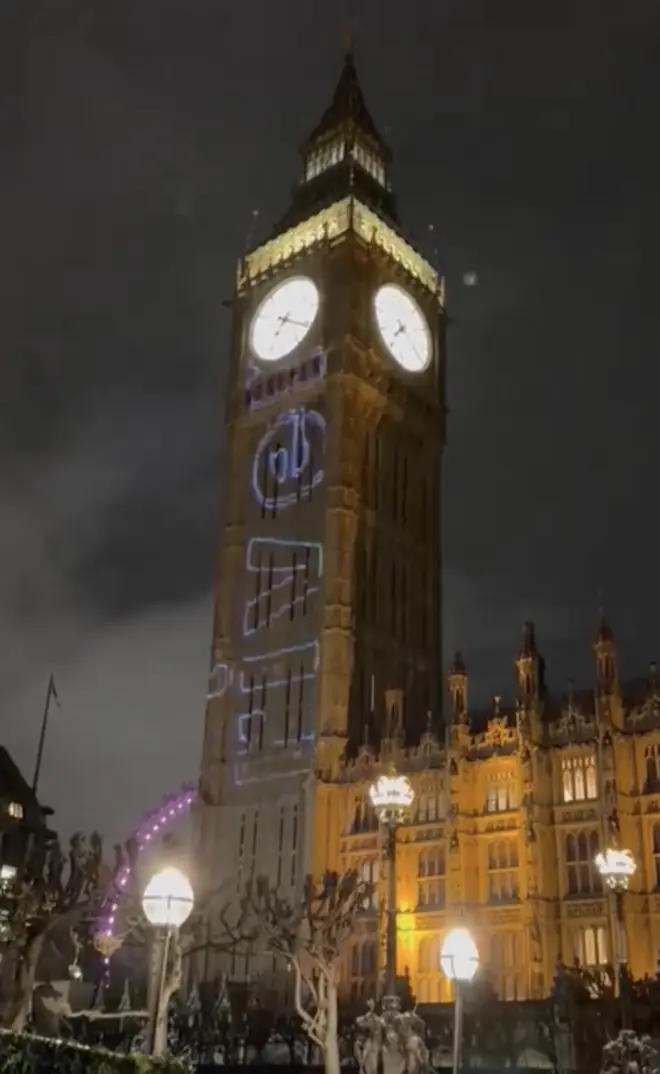
Clive Bull 1am - 4am
23 February 2024, 09:02

Watch Again: Nick Ferrari speaks to Home Secretary James Cleverly | 23/02
Home secretary James Cleverly has insisted he has not turned a "blind eye" to extremism after Suella Braverman claimed "Islamist cranks" have taken charge of Britain.
"From the river to the sea", a chant viewed by some as calling for the destruction of Israel, was projected onto Big Ben on Wednesday night.
Police were accused of standing by while it was beamed onto the landmark as Parliament descended into chaos during a vote on a Gaza ceasefire - sparked by fears over MPs' security, according to embattled speaker Sir Lindsay Hoyle.
Ms Braverman, Mr Cleverly's predecessor, wrote in the Telegraph: "They started with the Jews; there were stern words of disapproval from the top but things only got worse. The Islamist cranks and Left-wing extremists then took control of the streets; the police looked meekly on."
She added: "Turning a blind eye to fanatics has got us into this terrible situation: it needs to stop."
Responding on LBC's Nick Ferrari at Breakfast, Mr Cleverly said: "Suella was close to this for a long time, she was Home Secretary.
"She's clearly expressing frustrations that she's felt while she was in this role, and I understand that…

"It is absolutely the case that we must crack down on extremist behaviour. It is absolutely the case that we must not let our democracy be distorted through fear or intimidation."
He added that the government was giving "more powers" to the police and said: "I certainly have not turned a blind eye since I've been home secretary."
The messages projected onto Big Ben - or the Elizabeth Tower, as it is officially known - included "Stop Bombing Gaza - Ceasefire Now" and "Stop Bombs".
But it was the "river to the sea" slogan that drew the most criticism - as has the Met's lack of action after months of criticism that it wasn't doing enough to clamp down on alleged anti-Semitic slogans and chants at pro-Palestine demos.
The force said the projection, which was called "genocidal language" by the Campaign Against Antisemitism, had not broken any laws.
"This is a chant that has been frequently heard at pro-Palestinian demonstrations for many years and we are very aware of the strength of feeling in relation to it," a spokesperson said.

"While there are scenarios where chanting or using these words could be unlawful depending on the specific location or context, its use in a wider public protest setting, such as last night, is not a criminal offence."
The demonstration came as a blazing row broke out in Parliament over the Gaza ceasefire vote.
The SNP had tabled a motion calling for an immediate end to the fighting between Israel and Hamas, which would "stop the slaughter of innocent civilians" in Gaza.
It also made reference to the "collective punishment" of Palestinians, which would effectively accuse Israel of a war crime. Their motion was put forward as part of the SNP's opposition day, where it gets to decide what is voted on.
Labour had concerns about the wording but, amid fears some of its MPs could resign if compelled against voting for it, they tabled their own amendment instead calling for an "immediate humanitarian ceasefire".
The government also tabled its own amendment.
However, going against convention, Commons speaker Sir Lindsay accepted putting forward Labour's amendment for a vote. On opposition days, only government amendments are expected to be accepted.
It led to a row as Sir Keir Starmer was forced to deny intimidating the speaker into accepting Labour's call for a ceasefire.
Sir Lindsay said he did it so the "the widest range of propositions on which to express a view" could be heard, and also because he had become "very, very concerned about the security of all members" given the strength of public feeling about the conflict.
By Friday morning, a motion of no confidence in the speaker had reached 68 signatures from MPs.